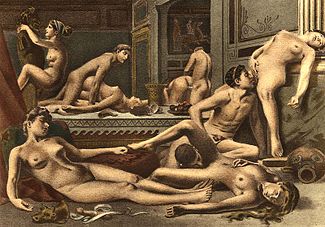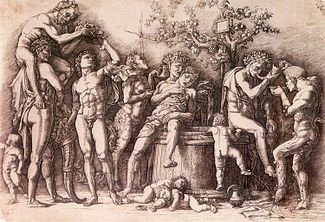Orgy: Difference between revisions
wwwwwwwwwwwwwww Tag: blanking |
ClueBot NG (talk | contribs) m Reverting possible vandalism by 76.179.145.139 to version by Anna Frodesiak. Report False Positive? Thanks, ClueBot NG. (2479397) (Bot) |
||
| Line 1: | Line 1: | ||
{{About||the religious rites of ancient Greece|Orgia|the American alternative metal band|Orgy (band)}} |
|||
its a drumset brand |
|||
[[File:Édouard-Henri Avril (25).jpg|thumb|325px|Illustration by [[Édouard-Henri Avril]]]] |
|||
[[File:Bacco - Mantegna, Andrea - Baccanale col tino -1470 ca.-.jpg|thumb|325px|right|''Bacchanal with a wine vat'' (c. 1475) by [[Andrea Mantegna]]]] |
|||
In modern usage, an '''orgy''' is a [[Group sex#Types of sex party|sex party]] where guests freely engage in open and unrestrained [[Human sexual activity|sexual activity]] or [[group sex]]. |
|||
[[Swinging (sexual practice)|Swinger]]s' parties do not always conform to this designation because at many swinger parties the [[sexual partner]]s may all know each other or at least have some commonality among economic class, educational attainment or other shared attributes. Some swingers contend that an orgy, as opposed to a sex party, requires some anonymity of sexual partners in complete sexual abandon.<ref name="differences cited in "Swinger Survey Results on Difference Between Orgies and Group Sex">{{cite web | url=http://www.swingersocial.com/the-swinger-blog/orgies-and-group-sex/ | title=Swinger Survey Results on Difference Between Orgies and Group Sex | publisher=The Swingers Blog | date=October 2010 | accessdate=April 26, 2012 | author=Wojick, Helen}}</ref> Other kinds of "sex party" may fare less well with this labeling. |
|||
Participation in an "orgy" is a common [[sexual fantasy]] and group sex targeting such consumers is a subgenre in [[pornographic film]]s. |
|||
The term is also used metaphorically in expressions, such as an "orgy of colour" or an "orgy of destruction" to indicate excess, overabundance. The term "[[wikt:orgiastic|orgiastic]]" does not generally connote group sex and is closer to the [[orgia|classical roots]] and this metaphorical usage. |
|||
==Ancient ''orgia''== |
|||
{{Main|Orgia}} |
|||
In [[ancient Greek religion]], ''[[orgia]]'' (ὄργια, sing. ὄργιον, ''orgion'') were [[Religious ecstasy|ecstatic rites]] characteristic of the [[Greco-Roman mysteries|Greek and Hellenistic mystery religions]]. Unlike public religion, or the private religious practices of a household, the mysteries were open only to initiates, and were thus "secret". Some rites were held at night. ''Orgia'' were part of the [[Eleusinian Mysteries]], the [[Dionysian Mysteries]], and the cult of [[Cybele]], which involved the [[Galli|castration of her priests]] in a frenzied trance. Because of their secret, nocturnal, and unscripted nature, the ''orgia'' were subject to prurient speculation and regarded with suspicion, particularly [[Religion in ancient Rome|by the Romans]], who attempted to [[Senatus consultum de Bacchanalibus|suppress the Bacchanals]] in 186 BC. ''Orgia'' are popularly thought to have involved sex,<ref>{{cite book|last=Shipley|first=Joseph Twadell|title=Dictionary of Early English|publisher=Philosophical Library|year=1955|pages=768|isbn=0-8065-2926-1}}</ref> but, while sexuality and fertility were cultic concerns, the primary goal of the ''orgia'' was to achieve an ecstatic union with the divine. |
|||
==See also== |
|||
* [[Bacchanalia]] |
|||
==References== |
|||
'''Notes''' |
|||
{{Reflist}} |
|||
'''Bibliography''' |
|||
*Adkins, Lesley and Adkins, Roy A. (1998). ''Handbook to Life in Ancient Greece'' ISBN 0-19-512491-X |
|||
*Alexander, Timothy Jay (2007). ''Hellenismos Today'' ISBN 978-1-4303-1427-1 |
|||
*Alexander, Timothy Jay (2007). ''A Beginner's Guide to Hellenismos'' ISBN 978-1-4303-2456-0 |
|||
*Burnet, John (2005). ''Early Greek Philosophy'' ISBN 1-4021-9753-5 |
|||
*Dillon, Matthew (2002). ''Girls and Women in Classical Greek Religion'' ISBN 0-415-20272-8 |
|||
*Maffesoli, Michel (1993). ''The shadow of Dionysus: a contribution to the sociology of the orgy'' ISBN 978-0-7914-1239-8 |
|||
*Persson, Martin (1970). ''The Minoan-Mycenaean Religion and Its Survival in Greek Religion'' ISBN 0-8196-0273-6 |
|||
*Wilson, Nigel Guy Wilson (2005.) ''Encyclopedia of Ancient Greece'' ISBN 0-415-97334-1 |
|||
==External links== |
|||
*{{Commonscat-inline|Orgy in art}} |
|||
*{{Commonscat-inline|Group sex|Orgy}} |
|||
<!--spacing--> |
|||
{{Human sexuality}} |
|||
[[Category:Group sex]] |
|||
Revision as of 06:30, 20 December 2015


In modern usage, an orgy is a sex party where guests freely engage in open and unrestrained sexual activity or group sex.
Swingers' parties do not always conform to this designation because at many swinger parties the sexual partners may all know each other or at least have some commonality among economic class, educational attainment or other shared attributes. Some swingers contend that an orgy, as opposed to a sex party, requires some anonymity of sexual partners in complete sexual abandon.Cite error: The <ref> tag has too many names (see the help page). Other kinds of "sex party" may fare less well with this labeling.
Participation in an "orgy" is a common sexual fantasy and group sex targeting such consumers is a subgenre in pornographic films.
The term is also used metaphorically in expressions, such as an "orgy of colour" or an "orgy of destruction" to indicate excess, overabundance. The term "orgiastic" does not generally connote group sex and is closer to the classical roots and this metaphorical usage.
Ancient orgia
In ancient Greek religion, orgia (ὄργια, sing. ὄργιον, orgion) were ecstatic rites characteristic of the Greek and Hellenistic mystery religions. Unlike public religion, or the private religious practices of a household, the mysteries were open only to initiates, and were thus "secret". Some rites were held at night. Orgia were part of the Eleusinian Mysteries, the Dionysian Mysteries, and the cult of Cybele, which involved the castration of her priests in a frenzied trance. Because of their secret, nocturnal, and unscripted nature, the orgia were subject to prurient speculation and regarded with suspicion, particularly by the Romans, who attempted to suppress the Bacchanals in 186 BC. Orgia are popularly thought to have involved sex,[1] but, while sexuality and fertility were cultic concerns, the primary goal of the orgia was to achieve an ecstatic union with the divine.
See also
References
Notes
- ^ Shipley, Joseph Twadell (1955). Dictionary of Early English. Philosophical Library. p. 768. ISBN 0-8065-2926-1.
Bibliography
- Adkins, Lesley and Adkins, Roy A. (1998). Handbook to Life in Ancient Greece ISBN 0-19-512491-X
- Alexander, Timothy Jay (2007). Hellenismos Today ISBN 978-1-4303-1427-1
- Alexander, Timothy Jay (2007). A Beginner's Guide to Hellenismos ISBN 978-1-4303-2456-0
- Burnet, John (2005). Early Greek Philosophy ISBN 1-4021-9753-5
- Dillon, Matthew (2002). Girls and Women in Classical Greek Religion ISBN 0-415-20272-8
- Maffesoli, Michel (1993). The shadow of Dionysus: a contribution to the sociology of the orgy ISBN 978-0-7914-1239-8
- Persson, Martin (1970). The Minoan-Mycenaean Religion and Its Survival in Greek Religion ISBN 0-8196-0273-6
- Wilson, Nigel Guy Wilson (2005.) Encyclopedia of Ancient Greece ISBN 0-415-97334-1
External links
 Media related to Orgy in art at Wikimedia Commons
Media related to Orgy in art at Wikimedia Commons Media related to Orgy at Wikimedia Commons
Media related to Orgy at Wikimedia Commons
